|
|
|
Sort Order |
|
|
|
Items / Page
|
|
|
|
|
|
|
| Srl | Item |
| 1 |
ID:
181129


|
|
|
|
|
| Summary/Abstract |
States accused of perpetrating cyber operations typically do not confirm or deny responsibility. They issue ‘non-denial denials’ or refuse to comment on the accusations. These ambiguous signals are prevalent, but they are largely ignored in the existing cyber literature, which tends to treat credit claiming as a binary choice. The ambiguity of non-denial denials and ‘non-comments’ allows states to accomplish two seemingly opposed goals: maintaining crisis stability and leaving open the possibility of their involvement in the attack. By deliberately remaining a suspect, a state can manipulate rivals’ perceptions of its cyber capability and resolve. Refusing to deny responsibility can also shape rivals’ perceptions of allies’ capabilities, enhancing the credibility of deterrence. All of this can be accomplished without the escalatory risks that would come with an explicit admission of responsibility. Where previous research has focused on the dangers of escalation and the limitations of costly signalling with cyber, we show that non-denial denials and non-comments make cyber operations considerably more useful than the literature appreciates.
|
|
|
|
|
|
|
|
|
|
|
|
|
|
|
|
| 2 |
ID:
103720
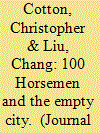

|
|
|
|
|
| Publication |
2011.
|
| Summary/Abstract |
We present game theoretic models of two of the most famous military bluffs from history. These include the legend of Li Guang and his 100 horsemen (144 BC), and the legend of Zhuge Liang and the Empty City (228 AD). In both legends, the military commander faces a much stronger opposing army, but instead of ordering his men to retreat, he orders them to act in a manner consistent with baiting the enemy into an ambush. The stronger opposing army, uncertain whether it is facing a weak opponent or an ambush, then decides to flee and avoid battle. Military scholars refer to both stories to illustrate the importance of deception in warfare, often highlighting the creativity of the generals' strategies. We model both situations as signaling games in which the opponent is uncertain whether the general is weak (i.e. has few soldiers) or strong (i.e. has a larger army waiting to ambush his opponent if they engage in combat). We then derive the unique Perfect Bayesian Equilibrium of the games. When the probability of a weak general is high enough, the equilibrium involves mixed strategies, with weak generals sometimes fleeing and sometimes bluffing about their strength. The equilibrium always involves the generals and their opponents acting as they did in the historical examples with at least a positive probability. When the probability of a weak general is lower (which is reasonable given the reputations of Li Guang and Zhuge Liang), then the unique equilibrium always involves bluffing by the general and retreat by his opponent.
|
|
|
|
|
|
|
|
|
|
|
|
|
|
|
|
| 3 |
ID:
120284
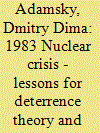

|
|
|
|
|
| Publication |
2013.
|
| Summary/Abstract |
This article distills insights for the scholarship of deterrence by examining the 1983 nuclear crisis - the moment of maximum danger of the late Cold War. Important contributions notwithstanding, our understanding of this episode still has caveats, and a significant pool of theoretical lessons for strategic studies remain to be learned. Utilizing newly available sources, this article suggests an alternative interpretation of Soviet and US conduct. It argues that the then US deterrence strategy almost produced Soviet nuclear overreaction by nearly turning a NATO exercise into a prelude to a preventive Soviet attack. Building on historical findings, this article offers insights about a mechanism for deterrence effectiveness evaluation, recommends establishing a structure responsible for this endeavor, and introduces a new theoretical term to the strategic studies lexicon - a 'culminating point of deterrence'.
|
|
|
|
|
|
|
|
|
|
|
|
|
|
|
|
| 4 |
ID:
093560
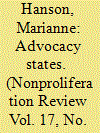

|
|
|
|
|
| Publication |
2010.
|
| Summary/Abstract |
While the current momentum for the elimination of nuclear weapons can be traced in part to the highly influential 2007 and 2008 Wall Street Journal opinion articles by George Shultz, William Perry, Henry Kissinger, and Sam Nunn, a more accurate picture of this momentum must take into account the role played by what are called here the "advocacy states." Motivated by a combination of humanitarian and strategic concerns, and mindful of the dangers of deterrence as well as proliferation, accidental use, and terrorist acquisition of nuclear material, these states have, for the past fifteen years, mounted a steady and repeated call for nuclear disarmament. Their activities have taken two main forms: the preparation of various state-sponsored reports investigating the utility and attendant dangers of nuclear weapons and making a strong case for nuclear disarmament; and the formation of like-minded groupings of states, namely in the New Agenda Coalition and the Seven-Nation Initiative, that are active in diplomatic forums and in practical projects. This article assesses the advocacy states' activities and shows that the states' reports and groupings increasingly focus on providing research, expertise, and technical assistance for the challenges facing disarmament. The article examines briefly the question of extended nuclear deterrence and disarmament (given that many of the advocacy states are Western allies) and considers the likely future role and activities for advocacy states. The author argues that these states have played a vital role in creating a climate in which the Obama administration can engage the movement toward disarmament.
|
|
|
|
|
|
|
|
|
|
|
|
|
|
|
|
| 5 |
ID:
015003
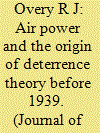

|
|
|
|
|
| Publication |
March 1992.
|
| Description |
73-101
|
|
|
|
|
|
|
|
|
|
|
|
|
|
|
|
| 6 |
ID:
091063
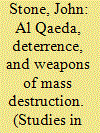

|
|
|
|
|
| Publication |
2009.
|
| Summary/Abstract |
This article takes issue with the frequently-made assertion that Al Qaeda cannot be deterred from employing weapons of mass destruction. It argues that Al Qaeda's leadership employs terroristic violence in a manner calculated to achieve a set of political goals. They are, in other words, rational actors who are sensitive to the potential costs and benefits associated with their actions, and thus are to some extent deterrable. The article examines a number of ways in which the lack of discrimination and proportionality associated with weapons of mass destruction might be expected to produce more problems than benefits for Al Qaeda and thus deter their use. It also considers some ways in which the West might seek to bolster these deterrent effects.
|
|
|
|
|
|
|
|
|
|
|
|
|
|
|
|
| 7 |
ID:
189959
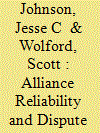

|
|
|
|
|
| Summary/Abstract |
States form defensive alliances hoping to deter adversaries and avoid war. However, scholars and policy analysts often worry that if an alliance fails to deter the promise of military support will encourage escalation, pushing disputants closer to war. We show that in many cases this concern is unwarranted. We use a game-theoretic model of alliance reliability and crisis bargaining to show that the same factors that indicate unreliability and provoke disputes also encourage alliance members to make concessions rather than risk war. We test this hypothesis using a sample of militarized disputes initiated against members of defensive alliances, where recent shifts in military capabilities represent changes in challengers’ estimates of alliance reliability. Less-reliable alliances are less likely than reliable allies to deter disputes, but they also decrease the probability of escalation relative to reliable alliances. Unreliable alliances need not encourage war; rather, they can discourage it.
|
|
|
|
|
|
|
|
|
|
|
|
|
|
|
|
| 8 |
ID:
121789
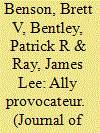

|
|
|
|
|
| Publication |
2013.
|
| Summary/Abstract |
The primary purpose of many alliances is to deter attacks on members of the alliance by potentially antagonistic states. Yet some alliances can increase the probability of conflict that may be initiated by alliance members. Cognizant of that possibility, states that wish to sustain peace may nevertheless intentionally form alliance commitments with revisionist leaders of other states. Faced with the partially conflicting goals of deterring antagonistic states while at the same time restraining allies, leaders often include in alliance treaties conditions that oblige allies to provide military assistance only if a member of the alliance is attacked by a state outside the alliance. However, other treaties may contain unconditional obligations to come to the defense of members of the alliance. Such alliances tend to arise from situations where some members of the alliance feel that their alliance partners need to have the flexibility even to engage in provocative behavior in order to deter the target of the alliance. Our analysis of alliance formation processes in the context of priorities that compete with each other provides a basis for two hypotheses. The first is that revisionist states with unconditional commitments from members of their alliance to come to their defense are more likely to initiate militarized conflict than states without such unconditional commitments. The second hypothesis is that revisionist states in alliances whose treaties stipulate that commitments to defend are conditional will be less likely to initiate militarized conflict than such states with allies who are committed to come to their defense without conditions. Statistical analyses of data generated with a view toward evaluations of both hypotheses (some of which provide new, more detailed categorizations of alliance treaties) suggest that they are valid.
|
|
|
|
|
|
|
|
|
|
|
|
|
|
|
|
| 9 |
ID:
064387
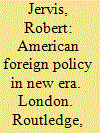

|
|
|
|
|
| Publication |
London, Routledge, 2005.
|
| Description |
ix, 184p.
|
| Standard Number |
0415951003
|
|
|
|
|
|
|
|
|
|
|
|
Copies: C:1/I:0,R:0,Q:0
Circulation
| Accession# | Call# | Current Location | Status | Policy | Location |
| 049867 | 327.73/JER 049867 | Main | On Shelf | General | |
|
|
|
|
| 10 |
ID:
152032
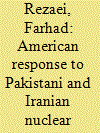

|
|
|
|
|
| Summary/Abstract |
This article explores the paradox in the reaction of the United States to the two different proliferation cases: Pakistan's proliferation and Iran's weaponization effort. The article tries to find answer to the following key question; why the United States, as one of the guardians of the Non-proliferation Treaty (NPT) which would prefer to see a region that is entirely free of weapons of mass destruction, ultimately has accepted Pakistan's proliferation, while imposed considerable amount of pressure to stop Iran from acquiring nuclear weapons.
|
|
|
|
|
|
|
|
|
|
|
|
|
|
|
|
| 11 |
ID:
041973
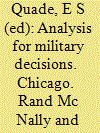

|
|
|
|
|
| Publication |
Chicago, Rand Mc Nally and Company, 1967.
|
| Description |
vii, 382p.
|
|
|
|
|
|
|
|
|
|
|
|
Copies: C:1/I:0,R:0,Q:0
Circulation
| Accession# | Call# | Current Location | Status | Policy | Location |
| 002082 | 327.174/QUA 002082 | Main | Withdrawn | General | |
|
|
|
|
| 12 |
ID:
001856
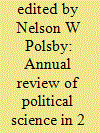

|
|
|
|
|
| Publication |
California, Annual Reviews, 1998.
|
| Description |
xx,477p.
|
| Standard Number |
0-8243-3301-2
|
|
|
|
|
|
|
|
|
|
|
|
Copies: C:2/I:0,R:0,Q:0
Circulation
| Accession# | Call# | Current Location | Status | Policy | Location |
| 042848 | 320.05/POL;1-2 042848 | Main | On Shelf | General | |
| 042849 | 320.05/POL;1-2 042849 | Main | On Shelf | General | |
|
|
|
|
| 13 |
ID:
170276


|
|
|
|
|
| Summary/Abstract |
The aim of the current study is to discuss which particular factors Russia considers as sufficient deterrent capabilities and whether the national defence models implemented in the Baltic countries have the potential to deter Russia's military planners and political leadership. Whilst the existing conventional reserves of NATO are sizeable, secure, and rapid, deployment is still a critical variable in case of a conflict in the Baltic countries because of the limited range of safe transportation options. However, whilst the Baltic States are developing their capabilities according to the priorities defined by NATO in 2010; which were updated after the invasion of Crimea in 2014, Russian military planners have meanwhile redesigned both their military doctrine and military forces, learning from the experience of the Russo-Georgian war, the Russia-Ukraine conflict, and other recent confrontations. Accordingly, there is a risk that the efforts of the Baltic countries could prove rather inefficient in deterring Russia.
|
|
|
|
|
|
|
|
|
|
|
|
|
|
|
|
| 14 |
ID:
016051
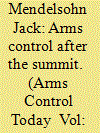

|
|
|
|
|
| Publication |
May 1993.
|
| Description |
10-14
|
|
|
|
|
|
|
|
|
|
|
|
|
|
|
|
| 15 |
ID:
004080
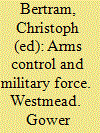

|
|
|
|
|
| Publication |
Westmead, Gower Publishing, 1980.
|
| Description |
x, 260p.
|
| Series |
Adelphi library; no.3
|
| Standard Number |
0566003449
|
|
|
|
|
|
|
|
|
|
|
|
Copies: C:1/I:0,R:0,Q:0
Circulation
| Accession# | Call# | Current Location | Status | Policy | Location |
| 020187 | 327.174/BER 020187 | Main | On Shelf | General | |
|
|
|
|
| 16 |
ID:
047975
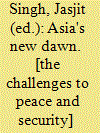

|
|
|
|
|
| Publication |
New Delhi, Knowledge world, 2000.
|
| Description |
xiii, 266p.
|
| Standard Number |
8186019286
|
|
|
|
|
|
|
|
|
|
|
|
Copies: C:2/I:0,R:0,Q:0
Circulation
| Accession# | Call# | Current Location | Status | Policy | Location |
| 043464 | 355.03305/SIN 043464 | Main | On Shelf | General | |
| 043465 | 355.03305/SIN 043465 | Main | On Shelf | General | |
|
|
|
|
| 17 |
ID:
147380
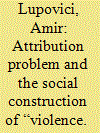

|
|
|
|
|
| Summary/Abstract |
Many scholars suggest that the difficulty of attaining cyber deterrence is due to the intrinsic characteristics of cyberspace. While this article does not aim to entirely refute this assertion, it suggests that the failure to successfully employ cyber deterrence is not determined by the technical challenges of cyberspace, but rather that the effects of these challenges are mediated through social context(s) and norms. To present this, I elaborate on the meaning of cyber deterrence and suggest that a rethinking of this term allows us to better address the various actors involved in the practices of cyber deterrence, as well as to better describe the intersections between the cyber and kinetic means affecting these practices. Building on the concept of cyber deterrence and borrowing from the constructivist approach to International Relations, I focus on how anonymity and “violence” are affected by social constructions and norms and in turn influence the success or failure of cyber deterrence. I briefly illustrate these assertions and their importance with regard to the case of Stuxnet.
|
|
|
|
|
|
|
|
|
|
|
|
|
|
|
|
| 18 |
ID:
166865
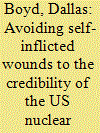

|
|
|
|
|
| Summary/Abstract |
Nuclear deterrence requires not only the reliability of a state’s strategic weapons and the willingness of its leaders to employ them but also an adversary’s appreciation of these conditions. Weapons perceived as failing to hold their targets at risk may lack deterrent value, just as retaliatory threats that are not believable may fail to deter, even if a state’s operational capabilities are robust. Both the technical and political credibility of the US nuclear deterrent may have suffered self-inflicted harm since the end of the Cold War, often as casualties of intemperate policy debates. In particular, doubts have been sowed about the reliability of aging US warheads under a science-based stockpile-stewardship regime meant to substitute for nuclear-explosive testing. Likewise, the credibility of US deterrent threats may have waned as American leaders have spoken ever more stridently about the horrors of nuclear war and nuclear terrorism, underscoring their extreme aversion to the risk of nuclear attack. Diminished credibility in both spheres threatens to compromise US national-security objectives ranging from nuclear nonproliferation to the outcomes of nuclear crises.
|
|
|
|
|
|
|
|
|
|
|
|
|
|
|
|
| 19 |
ID:
171141
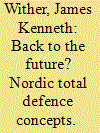

|
|
|
|
|
| Summary/Abstract |
Russia’s aggression against Ukraine has forced the greatest a re-appraisal of European security since the end of the Cold War. In the Nordic region, this has led to preparations for great power armed conflict in the region after a long period of strategic neglect. All three of the Nordic states examined here, Finland, Sweden and Norway, have adopted so called total defence policies. Total defence combines the armed forces and civil society in a comprehensive whole of society approach to security intended to deter an attack by making a target state a very challenging prospect for an aggressor. Finland retained a total defence policy after the Cold War, but has had to re-examine its utility for the contemporary threat environment. For Norway and Sweden, total defence means significant challenges reviving Cold War era planning in a very different security and societal context. This study examines current Nordic security concepts through the critical, elements of total defence policies: national resilience and territorial defence. It also addresses the role that alliances and partnerships play in contemporary Nordic total defence planning. An important question is the extent to which these total defence concepts effectively address the perceived political and military threat from Russia.
|
|
|
|
|
|
|
|
|
|
|
|
|
|
|
|
| 20 |
ID:
144291
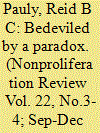

|
|
|
|
|
| Summary/Abstract |
This article explores how two influential American policy makers—Paul Nitze and McGeorge Bundy—wrestled with the idea of a norm against the use of nuclear weapons. Existing scholarship has overlooked how both Bundy and Nitze came to understand the idea of nuclear non-use, especially related to the credibility of threats to use nuclear weapons. Using documentary evidence from their personal papers, this article illuminates the thinking of Bundy and Nitze, finding that both engaged with the idea of a norm of non-use of nuclear weapons in their strategic writing and thought.
|
|
|
|
|
|
|
|
|
|
|
|
|
|
|
|
|
|
|
|
|